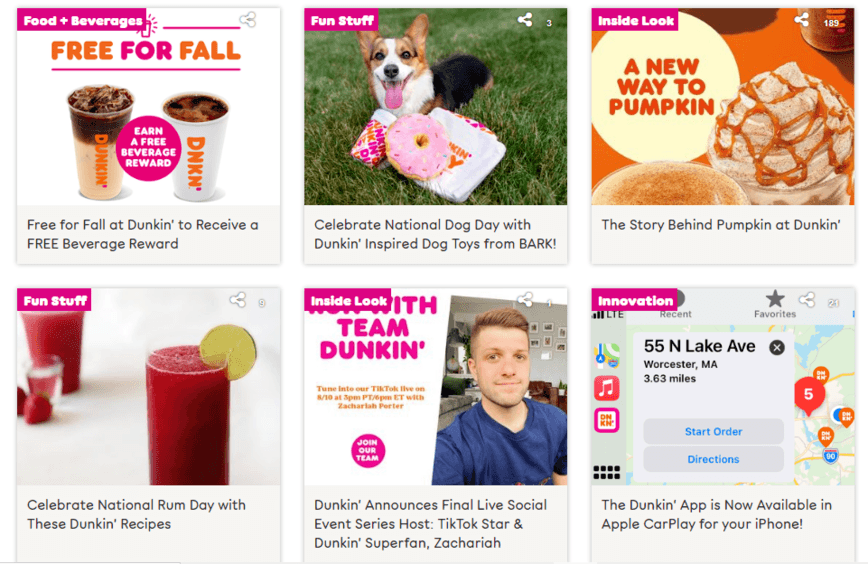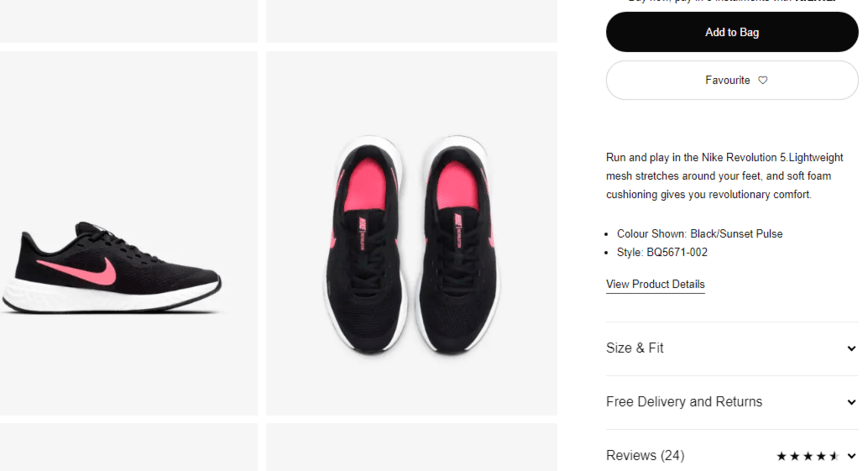-
 7 min. read
7 min. read
-
 Abby Fields
Abby Fields Branded Content Specialist
Branded Content Specialist
- Abby is a data-driven content marketer with certifications in inbound marketing and content marketing. She’s written hundreds of articles covering digital marketing topics — a few of her specialties include first-party data, marketing and data analytics, marketing strategy optimization, and SEO. When she isn’t writing or optimizing content, Abby loves to spend time reading the latest mystery novel, having movie marathons with lots of snacks, and jamming out to Shania Twain.
Generating leads is an essential part of any marketing strategy. Lead generation involves identifying, attracting, and eventually converting consumers into paying customers.
Understanding the ins and outs of different types of leads, such as marketing qualified leads (MQLs) and sales qualified leads (SQLs), can help attract and convert more potential customers, increasing your sales and revenue as a result.
In this post, we’ll go over the definitions of an MQL vs. SQL and the significant differences between the two, so you can develop effective lead generation strategies to attract ideal customers.
Keep reading to learn more! And if you’re ready to get started with top-tier lead generation services to boost the success of your business, WebFX can help.
Our team of experts has generated over 24 million leads for clients, just in the last five years. Speak with one of our strategists today by calling 888-601-5359 or contact us online to learn more about how we can drive revenue for your business.
Our digital marketing campaigns impact the metrics that improve your bottom line.
See Our Approach

$10 billion

24 million

7.14 million
What is a marketing qualified lead (MQL)?
An MQL comes from the efforts of your marketing strategies and campaigns.
In most cases, MQLs are users who have taken a next step after viewing your marketing materials, such as downloading a free guide, signing up for your emails, or filling out a quote or contact form, and they usually meet criteria set by your marketing team. 
Once a lead is marked as an MQL, your sales team can do more vetting to make sure they’re a good fit for your business and decide whether to move forward with their pitch or sales process.
What is a sales qualified lead (SQL)?
SQLs are consumers that your sales team has deemed qualified leads.
In other words, SQLs are consumers that your sales team would most likely want to pitch to or follow up with in hopes that they will convert into customers.
Although this can be different based on your business model, you can help convert SQLs into customers by answering their questions, providing them with information about your products, services, and pricing, and sending follow-ups like:
- Personalized sales pitches
- Custom emails
- Free trials
What is the difference between MQLs and SQLs?
Now that you understand what MQLs and SQLs are, let’s dive into some major differences between an MQL vs. SQL.
1. Lead behavior

One of the most significant differences between an MQL vs. SQL is their behavior on your website. This can include how they engage with your content, how much time they’re spending on your site, and which pages and content they are viewing.
MQLs will typically view your blog posts and guides or sign up for emails to learn more about a topic. MQLs could be first-time visitors to your website who found your content online, and they could also be frequent visitors who find your content helpful and informative.
On the other hand, SQLs typically view different pages and content on your website than MQLs.
Because SQLs are usually more ready to make a purchase, they might view your product and service pages, as well as pricing pages. They might also check out your reviews and testimonials if they are thinking about becoming a customer.
2. Stage in the buying funnel
Another difference between MQLs and SQLs is their stage in the buying funnel. MQLs are typically in the top stages of the buying funnel.
This means they have gained a basic awareness of your brand and have shown interest in your business through your content marketing, online advertisements, or social media marketing efforts.
Because they may not be ready to make a purchase yet, you will need to nurture MQLs until they are prepared to make a purchase. You can nurture leads by:
- Segmenting your email subscribers
- Using personalized marketing messages
- Creating valuable and helpful content
- Using pay-per-click (PPC) ads
- And more
The Dunkin Donuts blog is an excellent example of helpful and valuable content that their target audience is likely to enjoy and find useful. This can help them attract more MQLs and encourage them to spend more time on their website.

SQLs typically occupy the bottom stages of the buying funnel and are ready to make a purchase and convert into customers.
SQLs might request a quote or product demo, or they might fill out a contact form. They will usually view your products and services pages for more information and to learn about costs.
You can help encourage SQLs to convert with detailed product pages and descriptions, as well as customer reviews and testimonials.
In this example, Nike expertly shows plenty of product images, an informative description with information about delivery, sizes, and price, as well as plenty of customer reviews.

Because SQLs are ready to make a purchase, ensure you provide them with the information they are looking for, so they will choose your brand over your competitors.
3. Lead scoring
Lead scoring is also a significant difference between an MQL vs. SQL. Lead scoring is the process of assigning values to each lead you generate.
The leads with the most points are the most valuable leads for your business because they’re the most likely to convert. The process of lead scoring can help you identify which leads are MQLs vs. SQLs. Because MQLs are in the top stages of the buying funnel, they may have fewer points than SQLs, who are more likely to convert.
As a result, SQLs are the most valuable leads for your business, since they are already interested in purchasing your products and services.
However, that doesn’t mean you should neglect your MQLs, as they can still move down the buying funnel and convert into customers. MQLs may have a lower lead score than SQLs, but through effective lead nurturing strategies, MQLs will eventually build a relationship and trust with your brand and ultimately convert into loyal customers.
Bonus: When you partner with a top lead generation agency like WebFX, you get access to RevenueCloudFX, our leading innovative digital marketing tool that helps you score, track, and nurture your leads, all in one place!
Why is identifying MQLs and SQLs important?
Generating leads is necessary for any business, but attracting qualified leads is essential to increase sales and grow your business.
Why?
Because qualified leads are more likely to become customers. When you can spot the difference between MQLs and SQLs, you will be able to target your marketing messages accordingly, increasing the effectiveness of your marketing strategies and campaigns as a result.
And as a bonus, when you implement effective marketing strategies for an MQL and SQL, you will move them down the buying funnel until they are ready to make a purchase and become a customer, which will increase your conversion rate and sales.
Generate more leads and sales with WebFX
Are you ready to start generating more leads for your business?
Our award-winning team of experts has more than 29 years and 3 million hours of experience generating various types of sales leads for our clients. We can implement effective lead generation strategies that will boost revenue for your business.
Contact us online or speak with one of our strategists by calling 888-601-5359 today to learn more about how we can boost the success of your business.
Do you want to learn more lead generation and digital marketing strategies to increase your sales?
Then sign up for Revenue Weekly, our bi-weekly newsletter, to get the latest digital marketing strategies sent straight to your inbox!
-
 Abby is a data-driven content marketer with certifications in inbound marketing and content marketing. She’s written hundreds of articles covering digital marketing topics — a few of her specialties include first-party data, marketing and data analytics, marketing strategy optimization, and SEO. When she isn’t writing or optimizing content, Abby loves to spend time reading the latest mystery novel, having movie marathons with lots of snacks, and jamming out to Shania Twain.
Abby is a data-driven content marketer with certifications in inbound marketing and content marketing. She’s written hundreds of articles covering digital marketing topics — a few of her specialties include first-party data, marketing and data analytics, marketing strategy optimization, and SEO. When she isn’t writing or optimizing content, Abby loves to spend time reading the latest mystery novel, having movie marathons with lots of snacks, and jamming out to Shania Twain. -

WebFX is a full-service marketing agency with 1,100+ client reviews and a 4.9-star rating on Clutch! Find out how our expert team and revenue-accelerating tech can drive results for you! Learn more
Try our free Marketing Calculator
Craft a tailored online marketing strategy! Utilize our free Internet marketing calculator for a custom plan based on your location, reach, timeframe, and budget.
Plan Your Marketing Budget

Proven Marketing Strategies

Proven Marketing Strategies
Try our free Marketing Calculator
Craft a tailored online marketing strategy! Utilize our free Internet marketing calculator for a custom plan based on your location, reach, timeframe, and budget.
Plan Your Marketing Budget
What to read next





